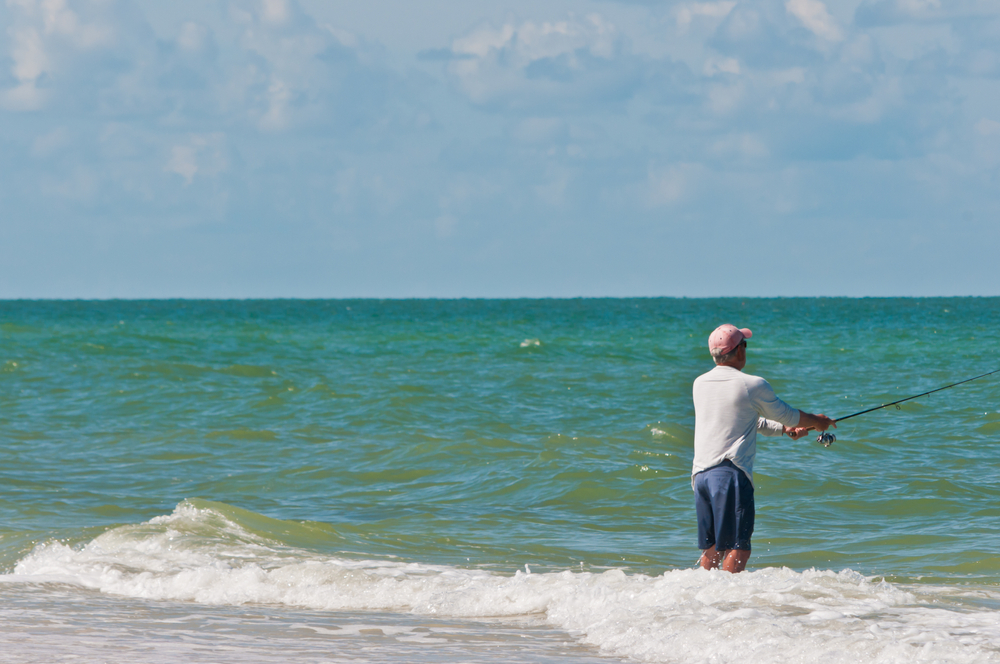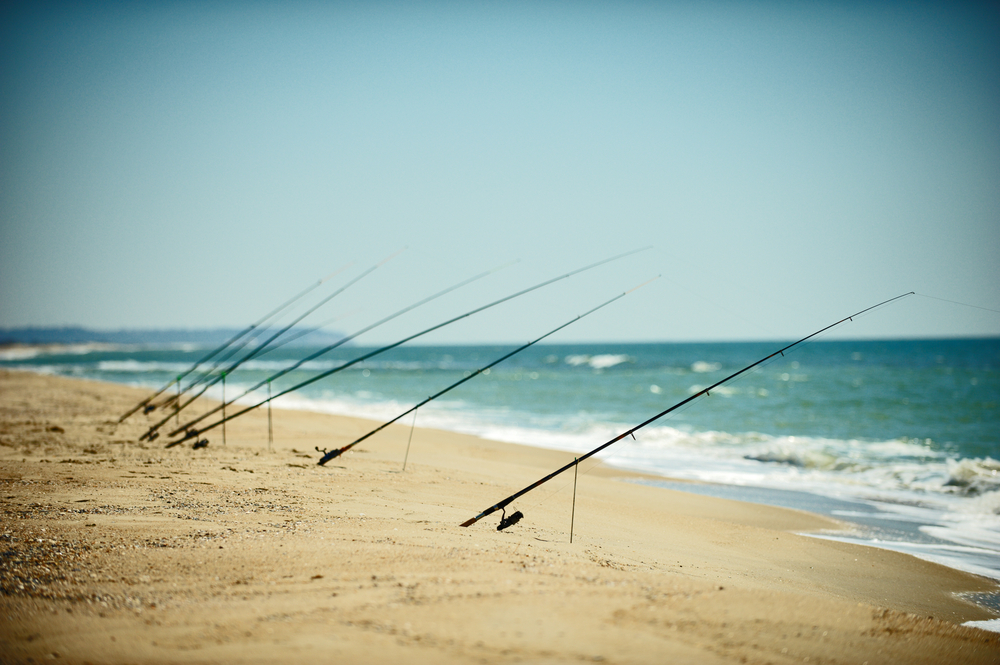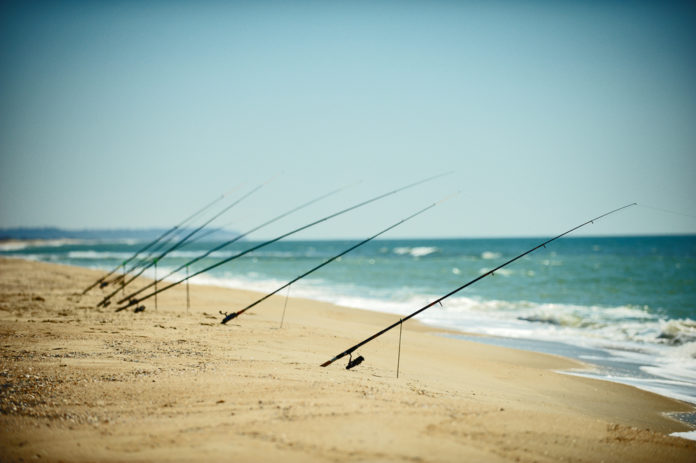What Is Surf Fishing?
Surf fishing generally comes down to one basic principle: to be able to fish in marine conditions and get a chance to catch big fish without having to use a boat. This approach is not just popular for its cost-effectiveness, however, as this style brings with it its own set of pleasures as well for the angler.
Surf fishing refers almost exclusively to saltwater, for as the name may suggest, the changing tides plays a factor for this exciting brand of fishing.
In the end, what you are able to catch in terms of fish species and size depends on where you fish, the conditions of the surf itself at that particular time, and also the baits and lures you are using. Many different tide and environmental conditions come into play, but this is one style of fishing that is very easy to get hooked on to.
So if you are looking for an inexpensive way to experience saltwater fishing, there are few choices quite as rewarding as surf fishing.
What Makes Surf Fishing So Popular?

For many anglers, landing a fish after wading through pounding waves can be a greater thrill than reeling up a catch from the comfort of a boat. Who wouldn’t get at least a little bit excited after a landing a shark from their own two feet?
Though not using a boat will save you money, many who enjoy this sport end up spending a great deal anyways on a vehicle that will get them around on the beach. The ability to move at ease across the beach on an atv, for example, gives the angler more freedom to find that hotspot. That is part of the attraction for many folks. Of course, checking local regulations is important to make sure such roaming is allowed.
Checking both for birds feeding at sea and schools of bait fish is one way that anglers get a clearer idea of where the fish are located. This provides a very exciting and naturalistic means of finding fish not often employed in other styles, like freshwater fishing. With experience, surf anglers begin to recognize where bluefish, redfish, or even steelhead are feeding at any given time.
For most surf fishing anglers, wading out into the water and really getting into the action is the real passion of the sport. Just be mindful of the potential of sharks cruising in when you start to develop that love for surf fishing. It is always best to do this with at least one buddy present, however, since the sea is unpredictable at best for anyone, no matter how experienced they might be.
Even large flounder and other fish can be driven towards the shore by the exceptionally aggressive surf fish species such as bluefish. The opportunity to observe nature first hand truly is amazing. Best of all, if you find the right location, catching monster fish is not uncommon.
Where Is Surf Fishing Done?
Fortunately for those who love to do it, surf fishing spots exist all over the world from nearly any coast you can imagine you can even surf fish from a jetty. There are people fishing from sandy beaches or even rough and ragged coastal conditions. The key is keeping safe and finding a spot that actually captures your interest. Since baitfish follow the shore lines, wherever these fish go there will be bigger and more aggressive species waiting to feast on them.
The Gulf of Mexico is home to the popular bluefish, but closer to the Florida side of the Gulf redfish become quite a common catch. For those not comfortable with the idea of wading in the water, pier surf fishing may be the best choice. This is a popular style along the West Coast – in the states of Washington, Oregon, and California in particular – because it is quite convenient and offers plenty of big fish that will come into the harbors and bay areas of the Pacific Coast. Be sure to check out online surf fishing reports for specific locations and tips for your area.
Surf fishing the Outer Banks of North Carolina is one of the most popular destinations along the East Coast of the United States given the large size of fish available. This is only one example on the East Coast as from Florida to New England you will find prime fishing locations.
What Species Work Best For Surf Fishing?
Again, this is an area where the possibilities are endless. People enjoy fishing for all different sorts of species that are not simply relegated to the deep sea fishing areas of the world’s oceans. Surf fishing for flounder is a very popular choice because these are large, tasty fish that are relatively easy to hook onto. Catching halibut by surf fishing is another popular pursuit given the renowned taste of this game fish.
In the southern waters of the United States, surf fishing for sharks is a common quarry because these fish can get upwards of 40 pounds. It takes a high level of skill to be able to reel them in, but getting to the point where you can land one of these prized fish can be very rewarding.
Of course, it would be silly to overlook that surf fishing for sharks is one of the most exciting styles of fishing out there today. The thrill is based in a large part on the danger. Those who understand that bait fish are the indicators of where the action is also know that sharks are going to be present where these fish school. Teams of anglers are often used to land a shark as handling this fish can be treacherous. You should never try and reel one in yourself, and it’s a good idea to sit-in on a team and watch – like at a tournament – before becoming one of the main anglers.
What Equipment Does Surf Fishing Require?

One of the most important aspects of surf fishing is getting the right kind of equipment. This is a niche style of fishing so having the specialized tackle needed will go a long way towards making sure you succeed. The typical surf rod is going to be 10-12 feet long, able to sling a six-ounce lead weight and the bait that goes along with it about 100 yards out to sea past where the surf is breaking on the beach. This also means that you are going to need a heavy duty spinning reel that you can operate easily. It is very important to be able to cast as far as possible since this is the easiest way to get to the fish that are biting in any given situation.
Anglers who regularly surf fish will tell you that you should have a tackle box, a backpack for extras you might want to bring with you, and some sort of ice chest so that you can store your bait, what you catch, and any cold drinks you might want. This chest can also doubles as a seat. Good sunglasses and sunscreen are both recommended as well for a more comfortable fish.
It is always best to focus on non-corroding gear because saltwater can be damaging. Even so, you will need to clean things off with fresh water once you get back home to help avoid rust. Those who will be using flies will need different types of surf fishing rigs and techniques than those using a heavy sinker to get the job done.
And most important of all, you need to have your fishing license on you, and it’s not a bad idea to have a copy of the fishing regulations for your area handy as well.
Surf Fishing Tips For Beginners
Try and use live bait as often as you can. Cut bait works too, but a striped bass would rather chomp down on a fresh eel than slabs of dead meat.
Don’t be afraid to move around. Just because you’re on your feet doesn’t mean you’re planted to one spot. Move up and down the bank, keep an eye out for activity and rely on trial-and-error until you find a hotspot.
For those just starting out, it is helpful to know that a surf fishing report can be of huge use to you, but you should also read all of the articles on surf fishing that you possibly can to get a good feel for this remarkable sport. In addition, surf fishing secrets are bound to be unlocked if you do the number one thing that many take for granted: find surf fishing guides who specialize in the area you will be fishing in. Their knowledge is invaluable and a key to making your time more productive. In addition, watching a surf fishing video series or reading guide books can go a long way towards teaching you what you need to.
If you read, watch videos, and learn all that you can from those who are experienced then you can quickly become quite skilled at this form of fishing.










